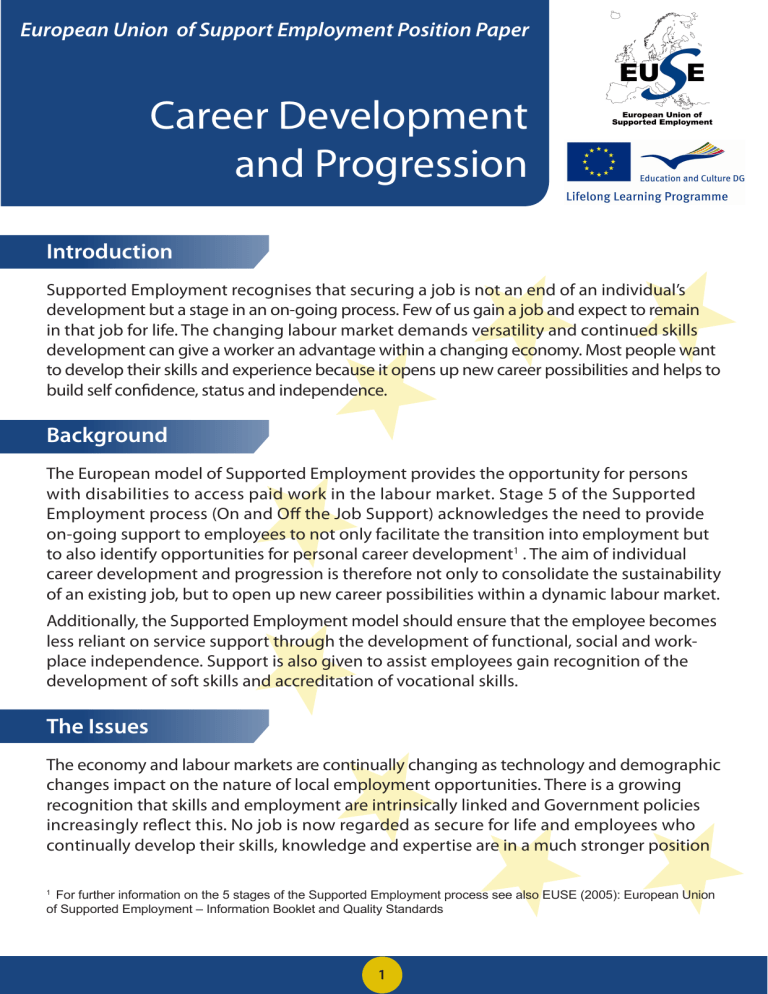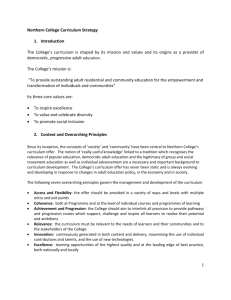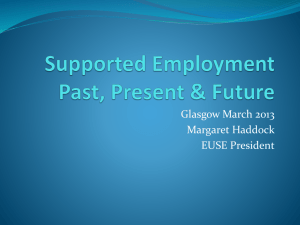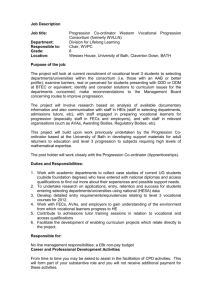Career Development and Progression

European Union of Support Employment Position Paper
Career Development and Progression
Introduction
Supported Employment recognises that securing a job is not an end of an individual’s development but a stage in an on-going process. Few of us gain a job and expect to remain in that job for life. The changing labour market demands versatility and continued skills development can give a worker an advantage within a changing economy. Most people want to develop their skills and experience because it opens up new career possibilities and helps to build self confidence, status and independence.
Background
The European model of Supported Employment provides the opportunity for persons with disabilities to access paid work in the labour market. Stage 5 of the Supported
Employment process (On and Off the Job Support) acknowledges the need to provide on-going support to employees to not only facilitate the transition into employment but to also identify opportunities for personal career development 1 . The aim of individual career development and progression is therefore not only to consolidate the sustainability of an existing job, but to open up new career possibilities within a dynamic labour market.
Additionally, the Supported Employment model should ensure that the employee becomes less reliant on service support through the development of functional, social and workplace independence. Support is also given to assist employees gain recognition of the development of soft skills and accreditation of vocational skills.
The Issues
The economy and labour markets are continually changing as technology and demographic changes impact on the nature of local employment opportunities. There is a growing recognition that skills and employment are intrinsically linked and Government policies increasingly reflect this. No job is now regarded as secure for life and employees who continually develop their skills, knowledge and expertise are in a much stronger position
1 For further information on the 5 stages of the Supported Employment process see also EUSE (2005): European Union of Supported Employment – Information Booklet and Quality Standards
1
European Union of Support Employment Position Paper
Career Development
and Progression to retain their jobs or have the flexibility to change career in response to personal aspirations or a changing economy.
People with disabilities tend to have lower skills levels than the average population and are therefore more vulnerable to economic change. They are over-represented in entry level jobs and often experience difficulties in progressing into the more skilled jobs that are being created within a knowledge based economy 2 . Often, the individual’s career path may involve a sideways move rather than to a more skilled job.
It is quite common in Supported Employment that employees with a disability are no longer on the Supported Employment caseload once they have settled into their job.
It could be argued that there is a contradiction within the process in the sense that on one hand Supported Employment is about supporting a person into a job then ‘fading’ the support to enable the employee to become an integrated member of the company, whereas, on the other hand, it is often considered that support should be for life and there is a need for further interventions for the employee to progress or develop their career.
There are of course merits on both sides, but it is clear that Supported Employment services are limited and struggle to cope with existing demand without the added pressures of supporting an individual to change their job as part of a career process.
Many people with a disability will not have worked for many years, if at all, and will not have had an opportunity to gain or update qualifications. As well as qualifications, employers have consistently stressed the need for softer skills such as teamwork, communication and interpersonal skills, reliability and problem solving abilities.
Traditionally, Supported Employment services have had a focus on securing employment and supporting the training of a person to complete the tasks and duties required in a role. Support is often faded once the worker has demonstrated the ability to complete the tasks and ongoing skills development can then be seen as the responsibility of the employer. Not all employers are proactive in identifying and meeting the skills needs of their employees and it can become the responsibility of the employee to seek learning opportunities either within or outside the workplace. The development of softer skills is sometimes supported by an appraisal process but is often neglected by the employer.
The development of soft skills or the accreditation of vocational qualifications can help to build a sense of self worth and support job retention where an employee works on a long term basis for the same employer. It may open up opportunities for promotion and could lead to less reliance on external support thereby reducing stigma. The nature of support could come from an educational rather than social care perspective.
2 Shima/Zólyomi/Zaidi (2008): The Labour Market Situation of People with disabilities in EU 25, European Center for
Social Welfare Policy and Research, Vienna.
2
European Union of Support Employment Position Paper
Career Development
and Progression
Often, the development of softer skills will have the additional benefit of supporting the worker’s social independence and create wider opportunities for independent living. This can assist with empowering the individual and developing personal aspirations.
The potential for progression and career development can also be influenced by the local labour market and the availability of appropriate jobs that match the individual job seekers’/ employees’ employment interests and aspirations.
Position of the European Union of Supported Employment
Career development should play an important role in Supported Employment during and beyond the process 3 . During the process, on-the-job support should be identifying opportunities for career progression and career development and enhancement opportunities should be explored. The employees have to be supported to consider internal and external career development and to make an informed choice on what is available and possible. Career development activities should also reflect the local and regional employment trends and needs of the labour market 4 .
Most often resources are limited and personal career development aspects have to be neglected during the Supported Employment process in favour of supporting job seekers to gain and employees to maintain paid work in the labour market. The European Union of Supported Employment acknowledges that on-going career support during and beyond the Supported Employment process is also a funding issue. EUSE sees career development and progression as an important part of the Supported Employment process which has to be appropriately resourced.
There is also a need for the Supported Employment service to find the balance between securing jobs for new job seekers and providing long term support for existing employees.
Supported Employment must also recognise that not all employees want change and many are content with their existing job and the terms and conditions of that job. This is especially true where the Supported Employment provider has found a suitable job match for their employee and has ensured that the employee made informed choices regarding their employment preferences. There is an increasing focus by governments on raising the minimum level of basic skills and vocational qualifications and funding is often available to support work-based learning. Supported Employment can play a key part in this process by ensuring that workers with disabilities are supported to access and maintain
3 See also EUSE Position Paper “On and Off the Job Support”
4 See also EUSE Quality Standards in EUSE (2005): European Union of Supported Employment – Information Booklet and Quality Standards
3
European Union of Support Employment Position Paper
Career Development
and Progression these learning opportunities. This should be linked to a notion of long term personal planning through individual development plans and support to access appropriate advice and learning opportunities.
Workplace appraisal systems can be used as a focus for developing personal action plans and individuals can be supported to access state funded learning, but a key task for
Supported Employment services will be to support personal motivation and aspirations.
Conclusion
Supported Employment services should see career development and progression as an integral part of the Supported Employment process and seek to resource this activity appropriately. It is important to work in partnership with customers, employers and educational services to broker learning opportunities that help to empower individuals so that they can take advantage of wider vocational and social opportunities through higher personal aspirations. It is acknowledged by EUSE that is extremely difficult to establish a balance between using limited resources to secure employment opportunities for job seekers against using the same limited resources to focus on employees to progress or change their job to advance their career.
Further Reading
•
•
EUSE Position Paper “Values, Standards and Principles of Supported Employment”
EUSE Position Paper “On and Off the Job Support”
This document is available in alternative formats such as Braille, Audiotape or Electronically on request.
© European Union of Supported Employment 2009
The European Union of Supported Employment irrevocably grant(s) to any third party, in advance and in perpetuity, the right to use, reproduce, translate or disseminate this Position Paper in its entirety or in part, in any format or medium, provided that no substantive changes are introduced in the process, proper attribution of authorship and correct citation details are given, and that the bibliographic details are not changed. If the article is reproduced or disseminated in part, this must be clearly and unequivocally indicated. This project was funded by the European Commission
Lifelong Learning Programme but this paper does not necessarily reflect the European Commission’s views.
Produced by the European Union of Support Employment/Leonardo Partnership as part of the European Supported Employment Toolkit.
4 Designed by Dundee City Council, Scotland 2009







